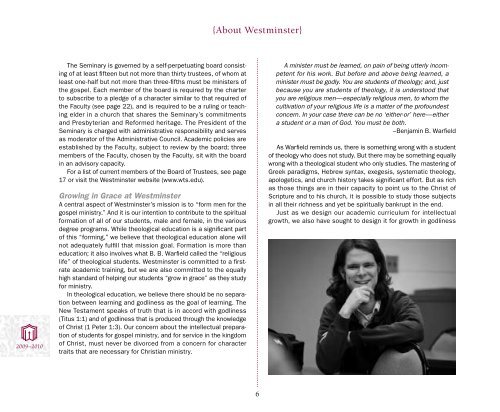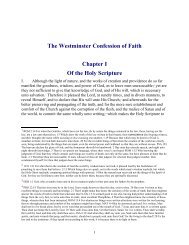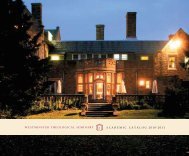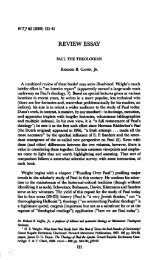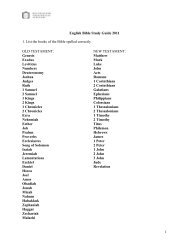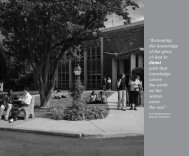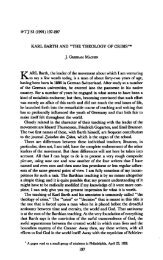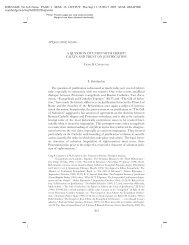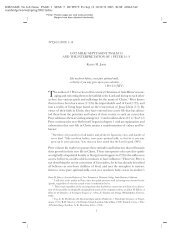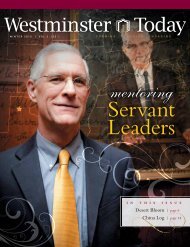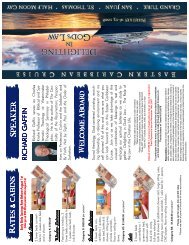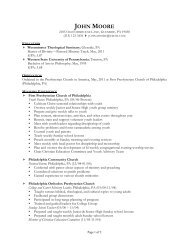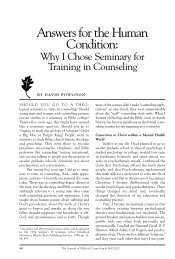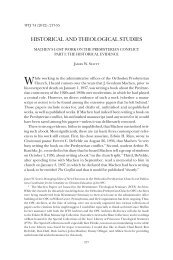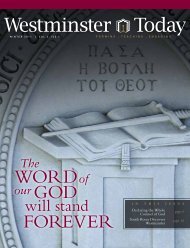2009 - 2010 Academic Catalog - Westminster Theological Seminary
2009 - 2010 Academic Catalog - Westminster Theological Seminary
2009 - 2010 Academic Catalog - Westminster Theological Seminary
Create successful ePaper yourself
Turn your PDF publications into a flip-book with our unique Google optimized e-Paper software.
{About <strong>Westminster</strong>}<br />
<strong>2009</strong>–<strong>2010</strong><br />
The <strong>Seminary</strong> is governed by a self-perpetuating board consisting<br />
of at least fifteen but not more than thirty trustees, of whom at<br />
least one-half but not more than three-fifths must be ministers of<br />
the gospel. Each member of the board is required by the charter<br />
to subscribe to a pledge of a character similar to that required of<br />
the Faculty (see page 22), and is required to be a ruling or teaching<br />
elder in a church that shares the <strong>Seminary</strong>’s commitments<br />
and Presbyterian and Reformed heritage. The President of the<br />
<strong>Seminary</strong> is charged with administrative responsibility and serves<br />
as moderator of the Administrative Council. <strong>Academic</strong> policies are<br />
established by the Faculty, subject to review by the board; three<br />
members of the Faculty, chosen by the Faculty, sit with the board<br />
in an advisory capacity.<br />
For a list of current members of the Board of Trustees, see page<br />
17 or visit the <strong>Westminster</strong> website (www.wts.edu).<br />
Growing in Grace at <strong>Westminster</strong><br />
A central aspect of <strong>Westminster</strong>’s mission is to “form men for the<br />
gospel ministry.” And it is our intention to contribute to the spiritual<br />
formation of all of our students, male and female, in the various<br />
degree programs. While theological education is a significant part<br />
of this “forming,” we believe that theological education alone will<br />
not adequately fulfill that mission goal. Formation is more than<br />
education; it also involves what B. B. Warfield called the “religious<br />
life” of theological students. <strong>Westminster</strong> is committed to a firstrate<br />
academic training, but we are also committed to the equally<br />
high standard of helping our students “grow in grace” as they study<br />
for ministry.<br />
In theological education, we believe there should be no separation<br />
between learning and godliness as the goal of learning. The<br />
New Testament speaks of truth that is in accord with godliness<br />
(Titus 1:1) and of godliness that is produced through the knowledge<br />
of Christ (1 Peter 1:3). Our concern about the intellectual preparation<br />
of students for gospel ministry, and for service in the kingdom<br />
of Christ, must never be divorced from a concern for character<br />
traits that are necessary for Christian ministry.<br />
A minister must be learned, on pain of being utterly incompetent<br />
for his work. But before and above being learned, a<br />
minister must be godly. You are students of theology; and, just<br />
because you are students of theology, it is understood that<br />
you are religious men—especially religious men, to whom the<br />
cultivation of your religious life is a matter of the profoundest<br />
concern. In your case there can be no ‘either-or’ here—either<br />
a student or a man of God. You must be both.<br />
–Benjamin B. Warfield<br />
As Warfield reminds us, there is something wrong with a student<br />
of theology who does not study. But there may be something equally<br />
wrong with a theological student who only studies. The mastering of<br />
Greek paradigms, Hebrew syntax, exegesis, systematic theology,<br />
apologetics, and church history takes significant effort. But as rich<br />
as those things are in their capacity to point us to the Christ of<br />
Scripture and to his church, it is possible to study those subjects<br />
in all their richness and yet be spiritually bankrupt in the end.<br />
Just as we design our academic curriculum for intellectual<br />
growth, we also have sought to design it for growth in godliness<br />
6


